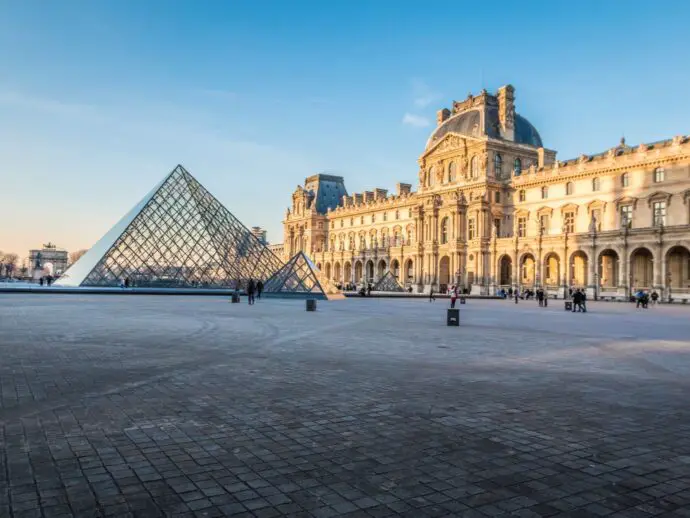Whether you want to challenge your mind with quirky exhibits at London’s Tate Modern or prefer thought-provoking pieces like Picasso’s ‘Guernica’ in Madrid, when it comes to art, Europe has it all. It’s the perfect setting for a summer art tour, no matter what you’re into. And the best bit? Europe is such an easy continent to travel around, so you don’t have to limit yourself to a single city. If you have a week or two to play with, and want to see as much as you can, here’s what you need to think about when planning your summer art extravaganza.
Consider how you want to get around
One of the joys of Europe is that there are so many different ways you can travel around, whether that’s within a single country or across borders. Many visitors like to use the trains, which are efficient and affordable. The rail network in Europe is extensive, so it’s relatively easy to travel between all the major cities. So, if you want to explore everywhere from Berlin to Bucharest, the trains have you covered.
If you fancy travelling in style as you tick off some of Europe’s hottest exhibitions, why not book a private charter flight? This option may come with a higher price tag than the trains, but you’ll enjoy a far more luxurious transfer, with a schedule that’s personalised to your itinerary. You’ll arrive in your destination a lot faster too, giving you more time on the ground to enjoy the sights and exhibitions.
It’s also possible to hop around Europe on scheduled flights, although you’ll need to plan ahead to make sure all your connections work and seats aren’t booked up. You’ll spend a lot of time waiting around in airports with this option, so unless you have a lot of time to spare, this choice probably isn’t the best one. Many people fly into Europe, then use trains to explore before flying home at the end of their trip.

Pick accommodation to suit the theme of your trip
If you’re on the art trail in Europe, you should consider staying in hotels that fit with the theme of your trip. Europe is one of the best places in the world for classical hotels with a bit of artistic flair, often with Renaissance architecture to get you in the mood. For properties like these, look in the historic quarters of the cities that you’re visiting, as this is where you’ll find the oldest and most charming hotels. By staying in the city centre you’ll also have the top art galleries at your fingertips.
Another option is to rent a villa on the city outskirts or in the nearby countryside. From here, you can enjoy day trips into town but can then retreat to rural idyll in the evening and relax after a busy day checking out all the museums and galleries. Villas in places like Italy or France often ooze with traditional charm, and many date back a few hundred years. For the ultimate luxury getaway, book a villa that comes with its own chef, butler, and chauffer so you can enjoy a slice of the high life while indulging your artistic passions.
Make a list of all the galleries you want to visit
The best way to start planning your European art tour is to look at the museums and galleries that most take your fancy. Which ones are at the top of your to-do list? It can be a bit overwhelming trying to whittle down your choices, as Europe is crammed full of incredible cultural attractions. So here are a few ideas to point you in the right direction. Some of the best destinations for art in Europe include Florence, Paris, and Amsterdam, so these are good places to kick off your travels.
In Florence, don’t miss the Accademia Gallery for Michelangelo’s famous ‘David’ statue, or the Uffizi Gallery where you’ll find a mind-blowing collection of Renaissance masterpieces by greats like Leonardo da Vinci and Caravaggio. Over in Paris, the Louvre Museum isn’t just home to the ‘Mona Lisa’, it’s also renowned for its temporary exhibitions. Meanwhile, in Amsterdam, the Van Gough Museum is a fan favourite, and the Rijksmuseum is known for its works by Dutch masters like Rembrandt and Vermeer.

Research temporary exhibitions
To make the most of your European art adventure, it’s important to do a bit of research beforehand. After all, you don’t want to miss an exhibition just because you didn’t realise it was on! Consider what art styles you’re interested in, then check out the programmes of the main museums and galleries in each city included on your itinerary.
Many venues will have temporary themed exhibitions running alongside their permanent gallery displays, so it’s worth spending a few minutes looking at their current schedules to see if anything takes your interest.
Book museum tickets in advance
If you’re planning on taking in some of Europe’s top art museums, it’s sometimes best to pre-book your tickets. You won’t be the only one’s visiting, and many places can sell out at peak times, or have strict capacity limits that mean you might miss out if you just turn up on the day. Some galleries have implemented a time-slot system, where you pick an arrival time to suit your schedule. Other venues allow you to purchase a day ticket which gives you access at any point during the chosen day. Make sure you check the terms when booking so you know exactly when to visit.
The other benefit of booking tickets in advance is that you may be able to ‘skip the line’, rather than stand in long queues waiting to get in. This can save a lot of time, thereby allowing you to visit more museums on the same day if you wish. Some tickets also include a guided tour, which can be a great way to gain better insight into the art you’re admiring.
Don’t try to see everything
There’s a lot of art to see in Europe, and even visiting a single gallery can feel exhausting. The trick is not to try and fit everything in. Just figure out what you most want to see in each museum, and focus on that rather than rushing round, taking in every square inch. One of the best ways to do this is with a local art guide, who will make sure you tick off all the key pieces whilst also listening to your ideas and tailoring a visit in accordance with your particular art tastes.
It’s also important not to stick solely to art galleries. Give yourself a bit of a break and sample some of the other show-stopping attractions offered by these famous European cities. Enjoy a night at the theatre in Paris, join an afternoon cooking workshop in Florence, or take a scenic canal tour to admire the bridges in Amsterdam.
It’s time to get planning
Europe is a vast holiday canvas to work with, and it can feel daunting knowing how to start planning a trip here. Yet sometimes the best way is to just dive straight in, start with your passions, and take it from there. After you’ve chosen your destinations, think about travel logistics to link everything seamlessly together. Book accommodation, and sometimes museum tickets, in advance to avoid disappointment, and remember to pace yourself as you explore. Once you have that nailed, you’re all set for an enviable adventure across the continent that birthed so many of the world’s greatest artists.





